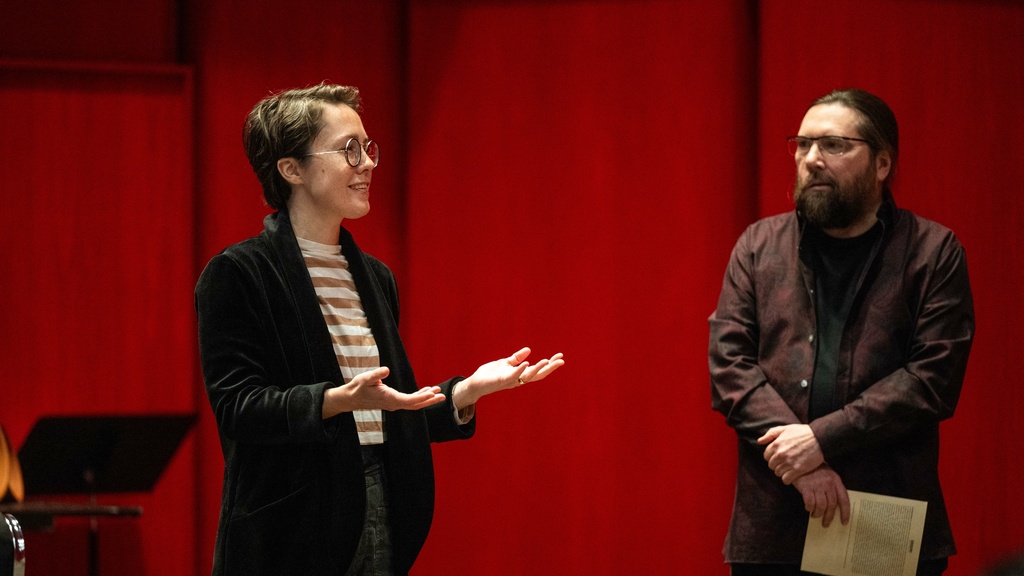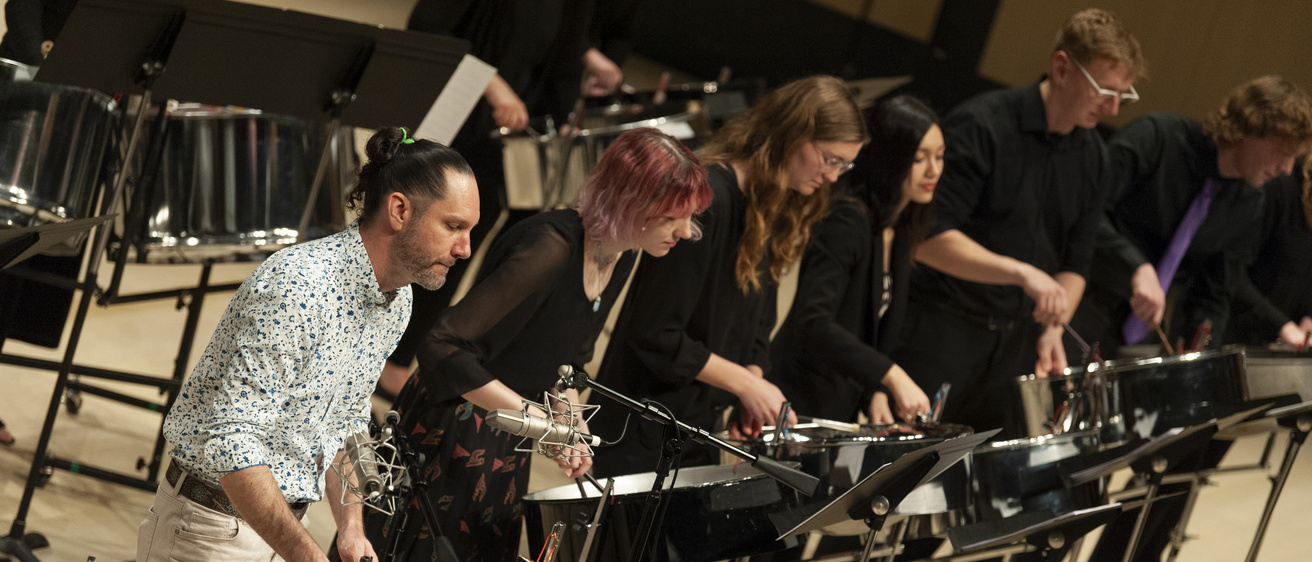Main navigation
Earn your MA in Percussion
The University of Iowa Percussion Program nurtures the serious study and creative exploration of percussion. Percussion students at Iowa have the advantages that a large and vital university community offers--like frequent residencies with world-class guest artists--while enjoying individualized attention and a supportive, welcoming environment and abundant opportunities to perform.
Iowa percussion’s comprehensive approach to education gives students the extensive background necessary to pursue future endeavors in the field. Graduates are regularly accepted into other major percussion programs as graduate teaching assistants, teach on the faculties of colleges, universities, and public schools, and perform in a wide variety of musical settings.
Graduate percussion auditions
The purpose of the graduate audition is to demonstrate your musical interests and abilities. Be sure to choose repertoire that is meaningful to you, distinguishes you as a musician, and represents your personal musical style. Graduate study in percussion at the University of Iowa is designed to help you find and/or develop your unique musical voice, to become a curious musical scholar, and to find your place in the modern musical landscape.
Auditioning for the Graduate Program in Percussion at the university requires a pre-screening of candidates. Prospective graduate students should be in touch with Dan Moore prior to submitting links to pre-screening videos.
At a minimum, the pre-screen should include three examples of mallet performances in contrasting styles (including both 2- and 4-mallet works), concert snare drum, and multi-percussion. Other desirable components include examples of chamber music, jazz, and world music performances as well as examples of conducting/coaching of ensembles, original compositions/arrangements, or examples of writing for marching percussion.
After passing the pre-screen, prospective graduate students are advised to come to campus for a live performance audition and interview. Prospective Teaching Assistants must interview in person.
Live auditions should include performances from the pre-screen videos as well as at least one work not included in the pre-screening. Orchestral Excerpts are not required for pre-screening or on-campus auditions.
Requirements and program planning
Requirements and program planning
General requirements
- Introduction to Graduate Study in Music (MUS:5300), 2 semester hours
Music theory requirements
Students exempt from MUS:5200 through the advisory examination in music theory must complete 6 semester hours from the following:
- Counterpoint Before 1600 (MUS:4200), 3 semester hours
- Counterpoint After 1600 (MUS:4201), 3 semester hours
- Jazz Theory (MUS:4730), 3 semester hours
- Tonal Analysis (MUS:5235), 3 semester hours
- Non-Tonal Analysis (MUS:5236), 3 semester hours
- Analysis of Popular Music (MUS:5237), 3 semester hours
- Special Topics in Theory and Analysis (MUS:5240), 3 semester hours
- History of Ideas in Music (MUS:6210), 3 semester hours
- Theoretical Approaches to Music (MUS:6211), 3 semester hours
- Theory Pedagogy (MUS:6215), 3 semester hours
- Advanced Tonal Theory and Analysis (MUS:6250), 3 semester hours
- Advanced Non-Tonal Theory and Analysis (MUS:6251), 3 semester hours
- Advanced Theory and Analysis of Popular Music (MUS:6252), 3 semester hours
Music history requirements
Select from the music history courses in the following list. Only one 4000-level course (taken at the University of Iowa or equivalent transferred in from another institution) may count toward the 6 semester hours required:
- Music and Gender (MUS:4320), 3 semester hours
- Medieval and Renaissance Music (MUS:4325), 3 semester hours
- Baroque Music (MUS:4330), 3 semester hours
- 18th-Century Music (MUS:4335), 3 semester hours
- 19th-Century Music (MUS:4340), 3 semester hours
- 20th-Century Music (MUS:4345), 3 semester hours
- Advanced Jazz History (MUS:4350), 3 semester hours
- American Music (MUS:4355), 3 semester hours
- Jazz Matters (MUS:4360), 3 semester hours
- Studies in Film and Music (MUS:4610), 3 semester hours
- Teaching Music, History, and Culture (MUS:6305), 3 semester hours
- Topics in Musicology (MUS:6310), 3 semester hours
- Historical Approaches to Music (MUS:6312), 3 semester hours
- Topics in Ethnomusicology (MUS:6314), 3 semester hours
- Foundations of Ethnomusicology (MUS:6315), 3 semester hours
- Renaissance Music Notations (MUS:6326), 3 semester hours
- Music Editing (MUS:6375), 3 semester hours
Ensemble participation
Major Ensemble (four semesters required), 1 semester hour each
Percussion area requirements
- Major Percussion (MUS:6037), 4 semesters, 8 semester hours
- Applied lessons are taken each semester until the recital requirement is completed. Requests for exceptions must be approved by the percussion professor.
- Advanced Percussion Ensemble (MUS:3150), 4 semesters minimum
- Normally, percussion majors participate in Percussion Ensemble every semester.
- MA Recital (MUS:6900), 2 semester hours
- The recital committee is selected by the percussion professor and the student. The percussion professor and other faculty members from either the applied or conducting areas complete this three member committee.
Final examination
The final examination committee is selected by the percussion professor and the student. The percussion professor and faculty members from both the theory and musicology areas complete this three-member committee.
Guest Artists
Steven Schick Residency
Percussionist and conductor Steven Schick visits the University of Iowa for a residency filled with student and community engagement.

Caroline Shaw and Sō Percussion
Composer and vocalist Caroline Shaw visited campus to perform at Hancher Auditorium with Sō Percussion and the Iowa Percussion Ensemble in March 2024, and spent time in residency with our students.
Create your academic path
You'll find degree overviews, requirements, course lists, academic plans, and more to help you plan your education and explore your possibilities.
Current course list
The MyUI Schedule displays registered courses for a particular session and is available to enrolled students. The list view includes course instructors, time and location, and features to drop courses or change sections.
Add a minor
Any student admitted to a graduate degree program in the School of Music may add a theory pedagogy minor by completing the required courses.
Percussion faculty

Dan Moore
Practice and perform
Need to book a music room, request an accompanist, check out audition information, rent a locker, or use a recording studio? Visit the Music Callboard for all scheduling and policy information.
